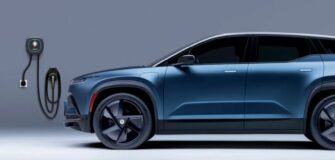Fueling the Future: Solar Panels on Electric Cars in India

The Indian automobile landscape is witnessing a transformative shift, and it’s happening under the sun. Electric cars equipped with solar panels are emerging as game-changers in the country, and this is not merely a fad. In this article, we delve into this innovation and how it is poised to revolutionize the way we think about sustainable transportation.
Who Is Making Electric Cars With Solar Panels?
While solar-powered electric cars are still in their early stages, one company leading the charge in India is Vayve Mobility. Based in Pune, Vayve Mobility unveiled its first solar-powered electric car, Eva, at Auto Expo 2023. Eva is equipped with a 14kWh battery pack that can be charged using solar panels mounted on its roof. These panels can generate up to 1kW of power daily, effectively extending the car’s range by 10-12km.
Eva boasts a range of 250km on a single charge and can achieve a top speed of 70km/h. The car is expected to make its debut in India in 2024, marking a significant step in the evolution of sustainable transportation.
Other Indian companies are also in the pursuit of solar-powered electric cars, with Tata Motors developing a solar-powered version of its Tiago EV. While these developments are promising, it’s clear that the concept of solar-powered electric cars is still in its infancy in India.
How Do Electric Cars With Solar Panels Work?
Electric cars with solar panels function by harnessing sunlight and converting it into electricity to charge the car’s battery. Solar panels, typically mounted on the car’s roof, consist of photovoltaic cells that convert sunlight into electricity through a semiconductor material. When sunlight strikes these cells, it generates an electric current, which is then used to charge the battery.
The amount of electricity generated by these solar panels depends on their size, efficiency, and the amount of sunlight available. On a sunny day, a typical solar-powered electric car can generate enough electricity to power the car’s low-voltage systems, such as headlights, radio, and air conditioning. However, it’s important to note that current technology does not yet allow solar panels to fully charge the battery of an electric car.
There are different methods to charge electric cars with solar panels. One approach involves connecting the solar panels directly to the car’s battery, though this is not particularly efficient. Alternatively, a solar inverter can be used to convert the direct current (DC) electricity generated by the solar panels into alternating current (AC), which can then be used to charge the car’s battery. While more efficient, this method is also costlier.
The benefits of using solar panels to charge electric cars include sustainability, cost savings, and a reduced environmental footprint. However, challenges such as limited electricity generation and the need for sunlight can be limiting factors.
Benefits of Solar Panels on EVs
Solar panels on electric vehicles offer several advantages:
Cost Savings:
By harnessing sunlight to charge your EV, you can significantly reduce your energy costs, ultimately saving money.
Increased Driving Range:
Solar panels extend your car’s range, ensuring you can travel further on a single charge.
Reduced Carbon Footprint:
Solar-charged EVs are more sustainable and eco-friendly, contributing to a cleaner environment.
Lighter and Smaller Batteries:
Solar panels can make batteries smaller and lighter, improving vehicle efficiency.
Aerodynamic Styling:
Solar panels can be integrated into a car’s design, enhancing aesthetics and reducing wind resistance.
The Future of Electric Vehicles in India
The future of electric vehicles in India is incredibly promising. The Indian government’s supportive policies, combined with increasing consumer awareness of environmental issues, are driving the growth of the EV market. Additionally, the decreasing cost of EV batteries is making electric vehicles more accessible and affordable to Indian consumers.
According to the Economic Survey 2023, the Indian EV market is expected to grow at a CAGR of 49% between 2022 and 2030, with an annual sales target of 10 million electric vehicles by 2030. This growth will significantly reduce India’s dependence on imported oil, making the country more energy-independent and environmentally conscious.
The integration of solar panels with electric cars is set to revolutionize the way we perceive and utilize sustainable transportation. With companies like Vayve Mobility pioneering this technology, we can look forward to a brighter and more sustainable future for the automotive industry in India. Solar-powered electric cars are not just changing the game; they’re helping to write a new, more sustainable rulebook for the industry.









